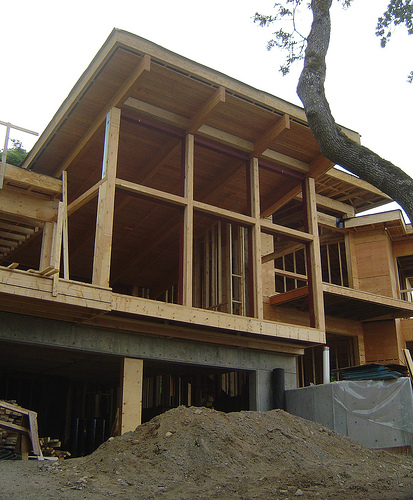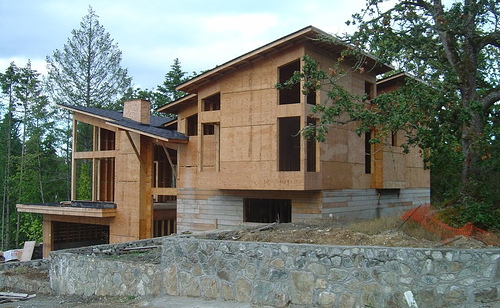March 21, 2016
Finding Traction in Construction Defect Claims against Contractors
New owners frequently struggle to timely resolve construction defect disputes with builders. For example, owners in Palm Beach Gardens, Florida have home workmanship complaints. Their HOA sued Kolter Homes, LLC for defects including lighting problems, window gaps, sloping balconies and water intrusion. On March 15, 2016, the Daily Business Review reported that Kolter began a new, larger development nearby before resolving their defects. Furious, the owners took to the streets to protest in front of the new project. Owners have rights to effective repairs under warranties arising out of the contract or law. When owners make warranty claims and builders send repair crews in response, these disputes are rarely resolved satisfactorily. The owner’s life is disrupted by living with the undesirable reality of the defects, communicating with the builder, and making arrangements for repairs that may not even be effective. For many owners the “playing field” seems unbalanced because the builder wrote the contract terms, knows the construction business, and has their money. How can owners break out of this cycle of frustrating customer service and get the house they initially bargained for? With smartphone cameras, it is easy for a buyer to record visible defects and the date they took the photographs. When calling and emailing isn’t enough, owners need more effective strategies for finding traction in construction defect claims against contractors.
Understanding Contractual & Warranty Rights. The sales process gives the buyer an understanding of what they will get for their money. New construction is an expensive consumer purchase. Builders know what consumers are looking to hear. Buyers usually make substantial financial sacrifices and commitments to purchase a property that they hope will fit their lifestyle and be a solid investment. Once they make the down payment, sign the contract and go to closing, the buyer’s bargaining position shifts. What builder promises, assurances and expectations can be legally enforced after they have been paid? Deceptive practices may lead to a consumer protection, fraud or even criminal prosecutorial action. However, for most owners the remedy for unfulfilled expectations lies in the contract and warranty commitments made by the builder. The owners can confirm what they bargained for by collecting and understanding the contract and warranty documents provided by the builder. This helps the owner to sort out sales talk from contract rights. Many of the documents may be organized into a packet provided when the parties went under contract or at closing. Other documents may be found elsewhere. For example, warranties, manuals, arbitration rules and other documents may be on file with the builder or available on its website. The contract may reference drawings that are on file with the city or county’s permitting office. If the documents are unclear on a particular point the owners or their attorney may have to consult building codes to understand their rights.
Mark Warranty Deadlines on the Calendar. The written warranties, contracts and state law will impose strict time limits on defect claims. Usually the builder is entitled to a written notice of a defect claim. For many warranties this must be done within a year. The owner usually has a subsequent deadline for submitting the claim to the court or arbitration. It is not really in the builder’s financial interest for the owner to focus on these deadlines. Just because the builder has actual knowledge of a defect does not preserve the claim absent legal notice requirements.
Obtain Reports for Defects & Estimates for Repairs. Once an owner knows the builder’s legal obligations, the next issue is diagnosing the defects and determining the cost to make it conform to the warranty. Owners making defect complaints to the builder have a strong sense of what is wrong from their day-to-day experience of living or working in the property. However, the defects may not be limited to what is immediately experienced by the senses. There may be latent defects that will require expensive repairs in a few years. Owners owe it to themselves to fully understand what is wrong and how much it would cost them to fix by a third party. After six to ten months of frustrating negotiations and ineffectual repairs, the owner may have lost confidence in the builder’s willingness or practical ability to make the repairs. The owner cannot effectively negotiate with the builder for a cash settlement without written assessments by experts that are independent from the builder. The needs of each case are different, and might require engineers, home inspectors, contractors or other qualified experts. At a minimum, the owner usually needs an experienced, licensed contractor. Strong communication skills are needed to handle cross-examination by builder’s counsel before a judge, jury or arbitrator. The written estimate must be for repair of the defects covered by the warranty and not simply projects that the estimator wants to sell and the owner wants to receive. A written estimate can confirm for the owner whether they have a $10,000.00 or $100,000.00 claim. It is in the owner’s best interests to find out the cost before any decisions must be made in light of warranty deadlines.
In construction disputes, the builder has some advantages. They prepared the contract and warranty documents with their lawyers before presenting them to the owners. The builder passed the contracting license exam and knows the building code requirements to get an occupancy permit. The builder negotiated defect complaints with customers before. But it is the owner who must live with or pay to repair construction defects that aren’t acceptably resolved in the warranty claim process. However, owners can level the playing field and obtain good results by determining the gaps between what was contracted for and the structure’s actual condition. A written estimate for defects covered by an unexpired warranty provides owners with what they need to obtain satisfactory results in litigation, arbitration or settlement negotiations. The builder has their own qualified legal and technical advisors working for them to deal with consumer complaints. Owners can level the playing field, gain traction in negotiations and make financial decisions with greater peace of mind by retaining their own counsel as soon as defect disputes arise, and before they become seemingly intractable.
Photo Credit: Pacific Northwest Architecture via photopin (license)
October 14, 2015
Common Misconceptions about Home Builder Warranties
Home buyers want assurances that someone will correct defects in construction to make it conform to what they bargained for. In the sale of new homes, these assurances usually come in the form of the builder’s warranties. Homeowners must make serious decisions about whether to go under contract, go through with closing and allow a year or so to go by without making a warranty claim. The purpose of this blog post is to identify some of the top misconceptions buyers have about home builder warranties that interfere with good decision-making.
- “My Warranty Coverage is Only Shown in the Packet of Contract Documents.” In fact, warranties can also arise out of legislation or court decision precedents. Warranty law is a solution to the problem that a buyer can inspect something, pay for it and later discover that the construction was materially defective. In Virginia, the courts traditionally ruled that in every contract with a builder there is an implied warranty of good workmanship unless the terms of the contract provided specific disclaimers or modifications. This rule helped consumers by requiring that the contractor would have to stand behind their work unless there was some fine print otherwise. Builders responded by having their attorneys write-up those warranty documents that can range from a paragraph to over 50 pages. The Virginia General Assembly observed that contractors were finding ways to get buyers through real estate closings on properties that did not conform to contracts in spite of the efforts of local building code enforcement officials and the buyer’s inspections. They passed legislation that creates implied warranties of quality workmanship that arise in the sale of each new home construction. Unfortunately, both contractors and homeowners are often unaware of these statutory warranties and their relationship with the written contract documents including the written limited warranties. Homeowners find it much easier to negotiate with their builder if they know the full extent of their warranty rights from review of the agreements and statutes.
- “My Neighbor Couldn’t Make Use out of Her Warranty, So I’m Also Out of Luck.” Tragically, many homeowners allow their warranty rights to expire without preserving their right to exercise them. Builders, neighbors, building code officials and inspectors can give useless or misleading legal advice. Because the contract documents vary builder-to-builder and the implied warranty laws vary by state, it is impossible to give a general summary that can be applied in every case. Understanding warranty coverage requires compiling the contract and warranty paperwork and state statutes. Usually, the basic warranty lasts for only one year.
- “My Builder is the Best Person to Ask about what they are Required to Fix.” Builders know that the courts will not expect them to continue making warranty repairs to one house for as long as they continue to be in business. To the extent a builder is still working on a house they have already sold, they aren’t making any new money. Contractors sometimes use written warranty paperwork to confuse or limit the buyer’s warranty rights at the time of sale. The builder’s warranty too often is used as a sales tactic to assuage nervous buyers concerned about construction defects. If the homeowner complains to the builder about construction defects after move-in, some contractors try to keep them occupied with inspections and ineffectual repairs. If the builder’s employees are frequently at the house, the owner probably won’t invite independent inspectors, experts or other contractors who might diagnose serious warranty claims and help the owner protect their rights. Once the owner starts to lose confidence in the builder or the warranty period is approaching, the owner needs the help of independent experts.
- “The Only Construction Defects Worth Focusing on are the Ones I Look at Everyday.” Homeowners frequently focus on the types of construction defects that they notice everyday. Defects in drywall, painting, grout, trim and other finish work can add up to thousands of dollars in repair costs, but they may not be the most substantial defects made by the builder. Water may be leaking into the house. Major systems such as roofing, plumbing, electrical, HVAC, etc. may require extensive repairs or replacement if not properly addressed during a warranty period. In order to properly diagnose these problems, the owner must coordinate investigation with inspectors, experts or other contractors who are independent from their builder. Every homeowner owes it to themselves to know the truth about the condition of their house.
- My Realtor, Mortgage Broker, Settlement Agent or Builder Recommended This Home Inspector, so they must be fine.” In hiring a third party inspector to help with a home purchase, the independence of the home inspector is just as important as their competence. Most professionals in a real estate transaction are only paid when the deal goes to closing. If a home inspector or other participant does find a defect that would cause a deal to not go through or be substantially delayed, the other professionals won’t want them to be involved in the next sale. Most home inspectors know enough about houses to provide a report that is a great help to the buyer. What’s important to the buyer is having an inspector who isn’t allied with the people being paid out of settlement. That way, the buyer knows he is working for her.
A homeowner should not rely solely on the contractor to clarify what their warranty rights are. It’s better to find out from qualified inspectors, engineers or other contractors what, if anything is wrong with your house. A qualified attorney can help determine whether those defects are legally covered before time runs out. If the closing on the new home was less than 12 months ago, there is a strong chance the owner may be entitled to repairs or financial compensation from the builder for failure to make the house conform to the warranty.
Legal Authority:
Va. Code § 55-70.1. Implied Warranties on New Homes.
Mann v. Clowser, 190 Va. 887, 59 S.E.2d 78 (1950)
Photo Credit:
Northwest Modernism via photopin (license)(provided to illustrate home construction – not known whether depicted property has any construction defects)
December 9, 2014
Resolutions for Homeowners Dealing with Construction Defects
A good home provides a safe, comfortable and enjoyable place to live. When a contractor makes mistakes in construction, renovation or repair, the owner or tenant has to live with those defects every day until the problem is resolved. The coming New Year is a good time for homeowners to prioritize addressing contractor defects. In 2015, devise a strategy for relief from construction defects and feel love for your home again.
The key to efficiently realizing a goal is outlining the steps needed to realize it. This gives the owner a “to-do” list that can be tackled step-by-step over time. This may include a warranty claim against the contractor. Many contractors stand by their work and will honor well-founded warranty claims. It’s difficult to build a business from a base of disgruntled former customers. With some contractors, legal assistance may be necessary to obtain relief under a warranty. No two construction defect cases are the same. In each case, the contracts, warranties, physical conditions and defects are different. However, there are strategies that can make the process easier for the homeowner. The following are 7 New Year’s resolutions for homeowners dealing with construction defects:
- Investigate Defects Fully: Examine and photograph the physical appearance of the defects. Obtain copies of the manufacturer’s installation instructions. Research online reviews or other information about the materials used. Wise homeowners focus first on any safety or health concerns. In some cases, taking temporary action to limit future damage may be necessary. Discovering the truth about the defect is a solid foundation for dealing with it.
- Organize Warranty Information. The contractor likely provided contracts, correspondence, warranties and invoices. Usually installers do not warranty the materials used. The warranties for materials may have been provided in the packaging or available from the manufacturer. These items must be reviewed together and can become easily misplaced if not organized.
- Consult Regarding Implied Warranties. Many homeowners are not aware that a written set of terms is not the only way that products and installation may be covered by a warranty. In Virginia, there are certain contractor warranties that arise under operation of law. Consult with a qualified attorney about how coverage may arise under implied or written warranties. Unfortunately, warranties are easily waived if claims are not timely pursued.
- Consult Regarding Obtaining Expert Reports About Defects. In order to fix the defect, ultimately a qualified person will need to do further work on the house. To prove a warranty claim in court, the owner may need an expert witness to testify regarding the breach of duties or the proper figure of damages. Depending on the needs of the case, that expert may be a home inspector, licensed contractor, engineer, tradesperson or professional estimator. Hiring an expert to provide assistance in a lawsuit, reports or court testimony is not like hiring a professional to work on the house. If an expert is being engaged to provide legal support or trial testimony, the owner’s lawyer is the proper representative to work directly with the expert. One of the most important characteristics in retaining an expert in these types of cases is independence. A homeowner is not well served by an inspector or other contractor who will not be able to testify against the interests of the contractor who committed the defects. It’s best to go completely outside of the referral network of the builder.
- Consider Goals for the Property. When a dispute with a contractor erupts, sometimes even smart homeowners may struggle to maintain focus on how the project fits in to their goals for maintaining and developing the property. The homeowner may need to adjust their goals to fit new circumstances.
- Preserve Copies of Contractor’s Representations: If the contractor used intentional concealment, fraud or misrepresentation in the course of selling his services, the owner may have a claim for enhanced damages. Fraud cases are very difficult to prove, and the facts of most cases don’t support them. However, sometimes misrepresentations can be found in e-mail, text message or social media communications. Savvy owners take care to preserve any electronic communications with the contractor’s representatives.
- Consult with Counsel About Pursuing Claims. Once the case has been properly investigated with the assistance of legal counsel, the homeowner is in the best position to go back to the contractor about the warranty claim and, if necessary, pursue a legal remedy.
Whether a homeowner’s best interests lie in simply fixing the problem on their own or pursuing a legal claim against the contractor depends upon the unique circumstances of the case. Homeowners have the benefit of control over the property where key evidence may be preserved. The New Year is a good time for families to take necessary action to protect their physical, financial and legal aspects of home ownership.
photo credit: ungard via photopin cc (I am not aware of any defects with the house depicted in this photo, which was chosen for its seasonal characteristics)



